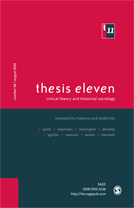Thesis Eleven 107(1): Special Section on Friedrich Kittler (2011)
Filed under journal | Tags: · media archeology, media theory, technology

“Friedrich A. Kittler was the most important, original and controversial German media theorist of his time. Departing from a philological background in German literature and arriving at a theory that combines the questions of technology, discourse and power, his oeuvre has had considerable impact on scholarship in the humanities over the past three decades. In contrast to Marshall McLuhan, who also started his career as a scholar in philology, Kittler’s theory is not anthropological in its epistemological set-up – media are not extensions of man; rather, Kittler’s theory is modelled after a Foucauldian-style archaeology but without Foucault’s ‘blind’ restriction to the medium of print.
Kittler’s works have either ‘produced’ ardent followers or have attracted vitriolic comments. These strong reactions to his works can in part be ascribed to his own academic style, which does not shy away from polemic commentary. Most of it is spurred by Kittler’s early desire to overcome a traditional type of literary criticism that ignores the impact of technology on the process of the production of meaning. And this lack of reflection is particularly apparent in the ‘art of interpretation’ (especially when this ‘art’ is relying on hermeneutics to justify its approach). Kittler’s work instead – strongly influenced by Shannon’s communication theory, Lacan’s writings on language and psychoanalysis and, as mentioned, Foucault’s archaeology of the humanities – attempted from early on to show how the technological dispositive (in various historical periods) is key to the cultural, societal and political environment at any time.
The scholarly articles and essays of this issue set out to introduce Kittler to the reader. The aim is to further a broader reception of his work in the anglosphere, and in particular in Australia, where he remains virtually unknown.” (from the Introduction)
With contributions by Geoffrey Winthrop-Young, Peter Krapp, Markus Krajewski, Matthias Bickenbach, Niels Werber, and Axel Fliethmann.
Publisher SAGE, November 2011
65 pages
PDF (updated on 2019-11-3)
Comments (3)Zeitschrift für Medienwissenschaft 1–7 (2009–2012) [German]
Filed under journal | Tags: · media studies, media theory, technology

Die Zeitschrift für Medienwissenschaft widmet sich den vielfältigen Ausrichtungen der Medienwissenschaft. Sie bildet mit Themenschwerpunkten die aktuelle medienwissenschaftliche Forschungstätigkeit ab und bietet ein Forum für methodische und inhaltliche Diskussionen.
Publisher Akademie Verlag (1-5); Diaphanes (6-)
Edited by Gesellschaft für Medienwissenschaft (Ulrike Bergermann, Oliver Fahle, Petra Löffler, Kathrin Peters, Claus Pias, Thomas Waitz)
ISSN 1869-1722
Zeitschrift für Medienwissenschaft 1: Motive (2009)
144 pages
ISSN 1869-1722
Zeitschrift für Medienwissenschaft 2: Materialität | Immaterialität (2010)
151 pages
Zeitschrift für Medienwissenschaft 3: Aufzeichnen (2010)
160 pages
Zeitschrift für Medienwissenschaft 4: Menschen & Andere (2011)
212 pages
Zeitschrift für Medienwissenschaft 5: Empirie (2011)
188 pages
Zeitschrift für Medienwissenschaft 6: Sozialtheorie und Medienforschung (2012)
264 pages
Mit einer Dokumentation zum kontroversen Habilitationsverfahren von Friedrich Kittler.
Zeitschrift für Medienwissenschaft 7: Die Serie (2012)
184 pages
View online
PDF (added on 2014-8-11)
George M. Young: The Russian Cosmists: The Esoteric Futurism of Nikolai Fedorov and His Followers (2012)
Filed under book | Tags: · cosmism, esotericism, noosphere, russia, technology

“The nineteenth and early twentieth century saw the emergence of a controversial school of Russian thinkers, led by the philosopher Nikolai Fedorov and united in the conviction that humanity was entering a new stage of evolution in which it must assume a new, active, managerial role in the cosmos. In the first account in English of this fascinating tradition, George M. Young offers a dynamic and wide-ranging examination of the lives and ideas of the Russian Cosmists.
Suppressed during the Soviet period and little noticed in the West, the ideas of the Cosmists have in recent decades been rediscovered and embraced by many Russian intellectuals and are now recognized as essential to a native Russian cultural and intellectual tradition. Although they were scientists, theologians, and philosophers, the Cosmists addressed topics traditionally confined to occult and esoteric literature. Major themes include the indefinite extension of the human life span to establish universal immortality; the restoration of life to the dead; the reconstitution of the human organism to enable future generations to live beyond earth; the regulation of nature to bring all manifestations of blind natural force under rational human control; the transition of our biosphere into a “noosphere,” with a sheath of mental activity surrounding the planet; the effect of cosmic rays and currently unrecognized particles of energy on human history; practical steps toward the reversal and eventual human control over the flow of time; and the virtues of human androgyny, autotrophy, and invisibility.
The Russian Cosmists is a crucial contribution to scholarship concerning Russian intellectual history, the future of technology, and the history of western esotericism.”
Publisher Oxford University Press, 2012
ISBN 0199892946, 9780199892945
280 pages
via falsedeity
Reviews: Stephen Roulac (Russian Journal of Books, n.d.)
Julia Mannherz (Slavic Review, 2013).
PDF (updated on 2020-10-1)
Comments (2)
